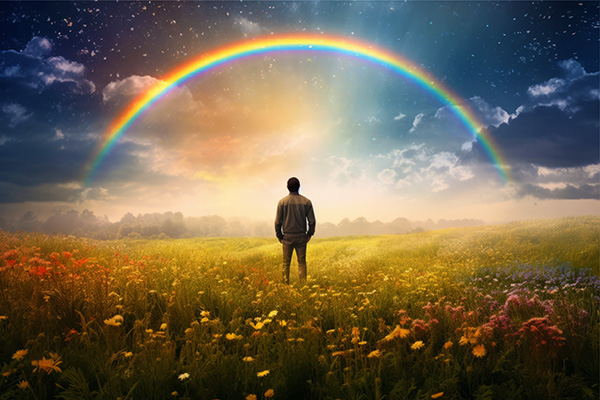spiritual traditions
Exploring The Benefits Of Reiki Healing
 Reiki healing offers a variety of potential benefits for both your physical and mental well-being. Reiki teaches that when our life force is high, we feel happy, radiant and vital, and when it is low, we feel sick, drained and stressed.
Reiki healing offers a variety of potential benefits for both your physical and mental well-being. Reiki teaches that when our life force is high, we feel happy, radiant and vital, and when it is low, we feel sick, drained and stressed.
Reiki is a form of energy healing in which practitioners use their hands to channel life force energy to the recipient. This universal energy or life force flows through all living things and is called ki in Japanese. The concept is similar to qi (or chi) in Chinese culture and prana in Indian culture.
A qualified Reiki healer is trained to channel healing energy to balance the flow of your life force energy and return you to a state of harmony and vitality.
Reiki has grown in popularity in recent years. Once viewed with skepticism by mainstream medicine, there’s a growing openness to complementary therapies, and Reiki is seen as a gentle and relaxing practice.
In today’s fast-paced world, stress is a major concern. Reiki’s reputation for promoting relaxation and reducing stress makes it attractive to many. Celebrities like Angelina Jolie, Nicole Kidman, Sandra Bullock and Gwyneth Paltrow and any mothers have spoken openly about their use of Reiki, giving it a touch of glamour and social validation.
The Mystical Symbolism Of The Hamsa
 The well-known Hamsa symbol has a rich tapestry of esoteric meaning that spans several cultures and religious traditions, including Islam, Judaism, and Christianity. It is commonly used as a protective amulet, offering protection from the evil eye, as well as a talisman or good luck charm, bringing its wearer blessings in the form of happiness, health, and fortune.
The well-known Hamsa symbol has a rich tapestry of esoteric meaning that spans several cultures and religious traditions, including Islam, Judaism, and Christianity. It is commonly used as a protective amulet, offering protection from the evil eye, as well as a talisman or good luck charm, bringing its wearer blessings in the form of happiness, health, and fortune.
The Hamsa is also known as the Khamsa, Hamesh, the Hand of Fatima, the Hand of Miriam, or the Hand of Mary. The names “Hamsa” and “Khamsa” both refer to the number five in Arabic while “Hamesh” means five in Hewbrew, all symbolizing the five fingers of the hand.
In Islamic tradition, this famous esoteric hand is named after Fatima al-Zahra, the youngest daughter of the Prophet Muhammad and his first wife Khadija. Fatima is known by many titles in Islamic tradition, of which al-Zahra (meaning “the Radiant One”) is one of the most prominent. Her life, devotion to family and faith, and moral integrity are admired and serve as an inspiration to Muslims around the world.
In Jewish culture, the hand symbol is named after Miriam, the sister of Moses and Aaron, who was a prophetess and is an important figure in Judaism. In some Christian contexts, it is also known as the Hand of Mary, although it is less commonly referred to by this name. In this instance it is associated with Mary, the mother of Jesus, who is revered for her purity, grace, and maternal protection.
Interesting Facts You May Not Know About Reiki
 People all over the world are turning to Reiki for its healing power, and it is now even being used in the medical field as a complementary therapy for the treatment of physical, emotional and mental illnesses.
People all over the world are turning to Reiki for its healing power, and it is now even being used in the medical field as a complementary therapy for the treatment of physical, emotional and mental illnesses.
Reiki is a spiritual philosophy and energy healing practice that was developed in Japan in the early 20th century by founder Mikao Usui.
Usui was a Tendai Buddhist whose lifelong quest for spiritual knowledge and healing techniques took him on a journey through many religious and spiritual traditions, including Shintoism, Buddhism, and Christian teachings, as well as the study of martial arts.
The most pivotal moment in Usui’s life occurred on Mount Kurama, a sacred mountain north of Kyoto. After 21 days of fasting and meditation, Usui had a profound spiritual experience of enlightenment that gave him the knowledge and ability to channel healing energy.
This experience led to the development of a healing system he called “Reiki,” which means “universal life energy” or “spiritual energy.” It’s based on the wisdom that “universal energy” can be channeled to support the body’s natural healing processes. Reiki is an extremely powerful energy, yet a remarkably gentle form of healing.
Find Your Rainbow In Troubled Times
 There are days when it seems like the storm winds and rain in your life will never stop. Those days when your mind is filled with shadows and your heart is heavy. When a grief or a broken heart seems like a never-ending wound.
There are days when it seems like the storm winds and rain in your life will never stop. Those days when your mind is filled with shadows and your heart is heavy. When a grief or a broken heart seems like a never-ending wound.
But trust me. One day soon you will walk out into the sunshine and see another beautiful rainbow! You will look at the colors of a perfect rainbow after a destructive storm of heavy rains and gasping winds, and you will know that all is well.
The storm may sometimes seem never-ending, but we always find a rainbow of promise on the other side. Then you will see the majesty of the spectrum of colors and the great arc that delights the sky. And if you follow that wondrous curve carefully, you may even find the pot of gold at its end!
In that perfect moment, you will forget the sadness and despair you felt before. The heaviness in your heart will be gone and you will be reminded that nothing is lost forever. The rainbows of life will always bring new moments, a new day, a new beginning. This is Spirit’s promise to us.
Since the dawn of time, rainbows have captured the imagination and beliefs of people in different cultures as a divine symbol of hope, healing, protection and rebirth.
Reclaim Your Personal Power With ‘Sat Nam’
 As a Kundalini Yoga teacher, I had the unique privilege of studying with Yogi Bhajan, the yoga master who introduced Kundalini Yoga to the Western world. Before he passed away in 2004, Yogi Bhajan gave me my spiritual name, Satya Kaur, which essentially means “princess” or “lioness” who embodies or strives to live by the principle of truth. It symbolizes a spiritual identity or path that focuses on integrity, authenticity, and the pursuit of spiritual truth.
As a Kundalini Yoga teacher, I had the unique privilege of studying with Yogi Bhajan, the yoga master who introduced Kundalini Yoga to the Western world. Before he passed away in 2004, Yogi Bhajan gave me my spiritual name, Satya Kaur, which essentially means “princess” or “lioness” who embodies or strives to live by the principle of truth. It symbolizes a spiritual identity or path that focuses on integrity, authenticity, and the pursuit of spiritual truth.
Our soul identity is the key to our life journey and spiritual growth. For this reason, at the end of each Kundalini Yoga class, the teacher says “Sat Nam” to the students. The class then repeats these words back to the teacher. Because of the name Yogi Bhajan gave me, this mantra will always have a special place in my heart.
The phrase is a Gurmukhi term that translates to “Truth is my name” or “True identity.” It is used as a yoga mantra to center the mind, connect with one’s true self, and remind us of our true essence and reality beyond the physical and mental constructs of the external world.
Saying “Sat Nam” to others is similar to the greeting “Namaste,” which means “The divine in me bows to the divine in you,” or “The spirit in me salutes the spirit in you.” For me, sacred affirmations like “Sat Nam” and “Namaste” have even more power and meaning now in the dawning Age of Aquarius.
The Ancient Wisdom Of The Two Wolves
 The story of the Two Wolves holds a special place among my childhood favorites. The moral of this Native American wisdom tale, thought to have originated with the Cherokee tribe, serves as a daily guiding light in my life.
The story of the Two Wolves holds a special place among my childhood favorites. The moral of this Native American wisdom tale, thought to have originated with the Cherokee tribe, serves as a daily guiding light in my life.
I must confess, there is some sentimental bias on my part, as this story also brings back lovely memories of my remarkable grandfather, Sequoia, a former medicine man and chief of the Cherokee Nation.
Variations of the story exist in various Native American cultures, and it typically goes like this:
One evening, an old Cherokee is teaching his granddaughter about life and says, “My daughter, a fight is going on inside all of us each day. It is the battle between the two wolves.”
“One wolf is evil — anger, envy, jealousy, sorrow, regret, greed, arrogance, self-pity, guilt, resentment, inferiority, lies, false pride, superiority, and ego. The other wolf is good — joy, peace, love, hope, serenity, humility, kindness, benevolence, empathy, generosity, truth, compassion, and faith.”
The granddaughter thinks about it for a minute and then asks her grandfather, “Which wolf will win?”
